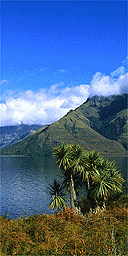
Dear Ellie,
Maybe it's because I spend two hours underground every day pressed against the armpits of strangers. Or because I live in a traffic-choked city where nothing works. Or because the nearest decent surf beach is four hours away. But I rather liked New Zealand.
In fact I loved it. All that space. It freaked me out at first. What if my car broke down and no one found me and I was eaten by wild dogs? What if I were to venture off the beaten track and stumble into some terrible Deliverance-style nightmare? What if I got swept off the beach while surfing and ended up in the middle of the Tasman shipping lane?
But after a week or so I started to calm down and get used to it. It takes a little time for New Zealand's quiet appeal to work its magic. Rushing around ticking mountains and tourist sites off a list doesn't do the country justice. You need to rest awhile; slow down and mellow out. Tropical places, like Bali, tend to make you do this as a matter of course because it's too hot to run about, but in a temperate climate you have to make a special effort.
I could rave about the efficient public transport, great food, fresh air, great scenery and friendly people, but New Zealand is already well known for that. What makes this country different is that it doesn't regard wildness as something from which it has to protect its people. Climb a mountain and there are no signs telling you to stay away from the edge of cliffs, keep to the paths or not to drop litter. Kiwis seem to know all this already and don't need nannying. For a city dweller used to being bossed about by signs at almost every beauty spot in England, this comes as a bit of a surprise.
For example, just 45 minutes out of Auckland is Kare Kare, the beach made famous by the film, The Piano. In England, this major tourist attraction would have a tea shop, souvenir shops and lots of prissy notices telling you not to walk on the grass. Here there is nothing. Just miles of pristine beach with a few amateur fishermen perched on the rocks and wild surf pounding the shore. Tuck yourself away beneath the cliffs (out of the relentless wind), feel the sun on your back, and pretend for a moment that the whole, uninterrupted view belongs to you.
Kiwis are known to be friendly, but they are also disarmingly hospitable. Like the stranger who gave me the keys to her house so that I would have somewhere to rest before I caught my flight home. Or the two women who offered to take me to the cinema because they were worried I'd be lonely travelling on my own.
Or when I was standing kitted up at an unfamiliar beach ready to paddle out into the surf and telling myself not to bottle it. I wondered aloud what would happen to me if I got into trouble or caught by a rip. "You'll be fine," a local told me. "We watch out for each other here - we're tight-knit."
The best example of guilt-free wilderness was a day's trek through the spectacular volcanoes in the national park on the North Island. Called the Tongariro Crossing, it is not what Kiwis would call "wild" as it is a clearly defined popular path, which attracts thousands of tourists and families. It takes about seven hours to walk the 17km track. The Kiwi definition of "wild" tends to involve wading through torrents and walking for days through impenetrable bush without seeing a soul.
The walk started deceptively easily, meandering through a valley, before climbing steeply up natural steps of solidified lava. Grannies and children bounded ahead of me while I struggled in the midday heat. The reward was the view of the still active volcano Ngarahoe, which some walkers decided to climb even though it was an extra three-hour return trip. This peak regularly punishes those who attempt it - broken ankles, legs lacerated by sulphurous rocks - and worse. There were no signs attempting to discourage you from tackling it. I gave it a miss.
Then on to the Red Crater, a deep, copper-coloured scar on the landscape, where the path pitched at a 45-degree angle over slippery volcanic scree, known as scoria, towards emerald crater lakes. Again, no warning that the best way to tackle this was simply to run down it, and hope to hell you didn't fall into the sulphur solution in the picturesque lakes. A few people had a nasty tumble in front of me but most, with the except of a Japanese girl in a white mac, seemed to take it in their stride. It was all a bit of a shock to someone brought up on public footpaths, but it was anything but dull.

